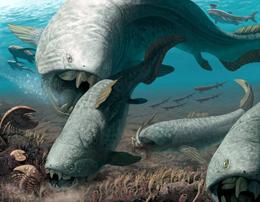In a brief story published in Danish on Videnskab.dk, Aske L. Sørensen and Tais W. Dahl explain one of the consequences of their latest EPSL paper: Earth was spinning faster 500 million years ago. The scientific paper entitled “Astronomically forced climate change in the Late Cambrian” documents Milankovitch-cycles in two drill cores through the Alum … Read More
Tracing global ocean oxygenation from calcitic brachiopods
The uranium isotope composition of seawater provide insights to how much sediment burial occurs globally in anoxia settings. Therefore, it is desirable to measure uranium isotopes to track the oxygenation state of the oceans through geological time. However, there is currently no geological archive that can reliably record the composition of ancient seawater. Calcitic brachiopods … Read More
Review: Tracing the global ocean oxygenation state with uranium isotopes
May 21, 2020 The stable isotope fractionation of uranium in nature – unrelated to radioactive decay – has led to a profound tool for tracing O2 in the Earth’s oceans from the geological record. Feifei Zhang has gathered many of the leading researchers in the community to provide a summary of how uranium isotopes are … Read More
New paper: The impact of land plant evolution on Earth’s climate and oxygenation state
The colonization of land by plants, fungi and animals has had a profound impact on Earth’s climate and oxygenation state. In a comprehensive review paper, we have summarized the current state of knowledge and compiled available evidence in support that terrestrial life has caused: Atmospheric CO2 decline and climatic cooling (permanent transition) Atmospheric O2 rise … Read More
New GCA paper: Volcanic eruptions triggered repeated marine anoxia and reveal global-scale feedbacks during the Permian-Triassic mass extinction 250 million yeers ago
The largest animal extinction event in recorded history occurred 251 Ma at the Permian-Triassic boundary coinciding with expansive marine anoxia. In a new study, led by postdoc Feifei Zhang, of a greatly expanded dolomite section from the Carnic Alps, Austria, marine anoxia is found to have expanded in two pulses separated by ~100,000 years. Global … Read More
Expansive ocean anoxia during the Late Devonian Hangenberg event
Marine animal extinction events have occurred episodically over the past 550 million years with expansive marine anoxia as the proximate kill mechanism. New evidence from a carbonate section in South China (Long’an) shows that the Late Devonian Hangenberg event should be counted as one such events. Postdoc Feifei Zhang have analyzed uranium isotopes in a … Read More
Forskerzonen: Mystery about animals in ancient anoxic oceans resolved
The newly discovered ocean ventilation events in the 500 million year old Alum shale ocean is described in Danish on Forskerzonen: Videnskab.dk
Tracking the global dynamics of Earth’s oxygen and biological production in deep time
In an article published online in PNAS Tuesday Sep 10th, we have demonstrated how a combination of metal isotope analyses in marine sedimentary rocks can constrain the global scale feedbacks between atmospheric oxygen, seafloor oxygenation, and marine biological production. The relationship between O2 and animal life turns out to be more entangled than first thought. … Read More
New study solves 500 million year old animal breathing paradox
Animals breath oxygen, but fossils of some of the earliest animals are found in what appears to be anoxic parts of the oceans. New research, led by Tais W. Dahl in collaboration with researchers from GEUS and Royal Holloway University London, shows that fluctuations in O2 availability at the seafloor allowed benthic animals to invade … Read More
Tais speaks at Teacher’s conference “Big Bang to Science”
The Niels Bohr Institute invites teachers to a conference called “Big Bang til Naturfag” (Big Bang to Science) to learn more about the history of the universe, our planet and the evolution life. On Aug 6, 2019 Tais W. Dahl is giving the talk entitled “Det tidligste liv” (The earliest life). Hereafter, Morten Allentoft from … Read More

